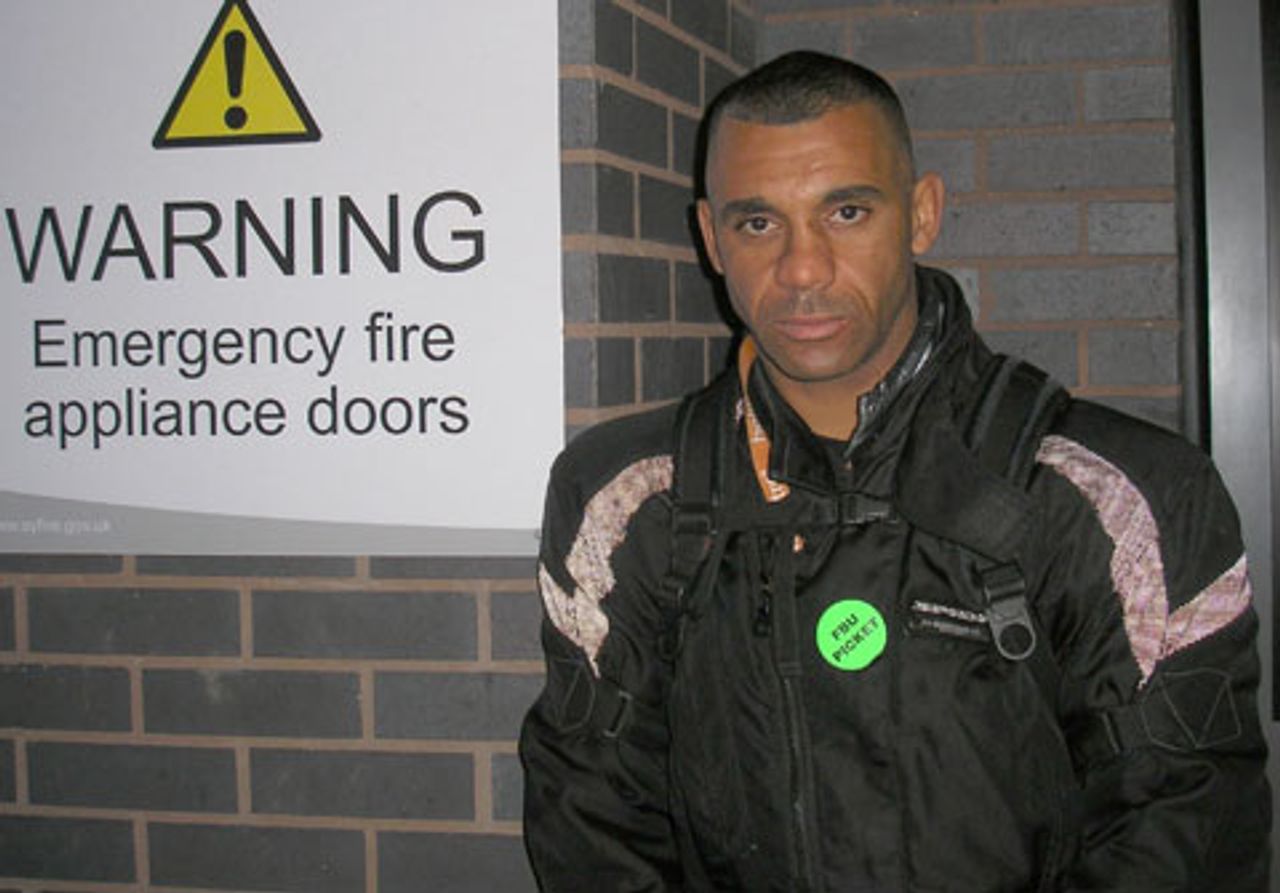At 18.00 hours (GMT) today, firefighters in South Yorkshire, England, are due to carry out the second of two 24-hour stoppages. The first was held on Monday.
Talks aimed at averting the strike are taking place. The Fire Brigades Union (FBU) has stated that unless South Yorkshire Fire and Rescue Authority (SYFRA) withdraw its threat to sack the region’s 744 firefighters, a further strike will occur on October 23.
Firefighters have been threatened by the SYFRA that their contracts will be terminated on New Years Day and new contracts with new terms issued. These will stipulate that firefighters work four consecutive 12-hour shifts. They currently work a pattern of two 9-hour day shifts followed by two 15-hour night shifts.
The FBU has sought to accommodate the demands of the SYFRA and offered a revised shift pattern of 10-hour days and 14-hour nights. It also offered to return to talks with the SYFRA if the latter withdraws the threat of mass sackings, but the SYFRA thus far had only offered to postpone the deadline.
Firefighters oppose the changes because of the impact the revised shift patterns will have on their personal lives and child care provision. FBU members voted to strike, even though the SYFRA has threatened to sack anyone who refuses to accept the new terms.
Claims made by the SYFRA prior to the first stoppage, that a significant number of firefighters would break the strike and go into work, turned out to be false.
Rank-and-file firefighters who spoke to a World Socialist Web Site reporting team at the Sheffield Central fire station picket line on Monday evening were concerned that the new planned shift changes are only the thin end of the wedge. Fears were raised that the aggressive attitude adopted by the SYFRA over an issue that appears relatively minor is a harbinger of further sustained attacks.
The firefighters are right to be concerned. The inroads that would be made into working hours, terms and conditions if the SYFRA is successful with its shift change plans would embolden it to attempt further cuts to services and attack wages, terms and conditions.
The SYFRA argues that the shift changes will help save a relatively meagre £4 million per year. Such savings represent a tiny fraction of the cuts that all the main three political parties have pledged to make. The Labour government and Conservative and Liberal Democrat opposition are united in their wish to make working people pay for the global financial crisis and the resulting multibillion-pound bailout of the banks.
Chief Fire Officer Mark Smitherman has described the threat of mass sackings as merely a “backstop” measure. But if the SYFRA is prepared to go so far as to threaten mass sackings over such an issue, then it is clear the dispute over shift patterns is being engineered as the first salvo in a wider series of retrenchments.
Shaun, with 10 years in the fire service, told WSWS reporters that the main issue in the strike was that there had been no negotiated settlement.
He said that the issue of the shift change to 12 hours had been reported confusingly in the media. Shaun has three children, and although the shift change would have a detrimental effect on workers’ family lives, this was not to say that the current arrangement was ideal. He was more concerned that the shift change proposal had the wider consequences of enabling management to more easily impose cuts in the service and reduce fire cover.
The present dispute could be part of a wider “war of attrition” by management, he added. He noted the glaring contradiction between managers whose salaries had doubled in recent years and arrived in “brand new Volvos” and the situation facing the firefighters in dispute.
“The difference between now and the 1970s is that the average working man is more indebted to creditors and mortgaged up to the hilt.”
Ben, who has worked as a firefighter for seven years, said that the main issue for him in the dispute was “the manner of the implementation” of the 12-hour shift change. “This cancellation and re-issuing of contracts has never occurred before. There is a feeling, if it happens here, then it can be implemented in all brigades. That’s why there are firefighters here today from Liverpool and London.
“The ‘Integrated Risk Management Plan’ means cuts in fire cover. The entire public sector has very hard times to come. There have been massive savings put into the budget over the next two years.”
 Del
DelDel, with 14 years’ seniority, currently works at a station across the city and is retraining. He said, “We feel that the plans management have put forward to us are constantly changing. The 12-hour shift change started as a ‘non-cashable saving’ and now it’s been changed to a ‘cashable saving.’ This is the thin edge of the wedge. The Framework Document 2008 explains they intend to redeploy their resources where they’re needed.”
“My partner works in a school as a Child Care Assistant (CCA), and under the council’s ‘Pay and Grading’ scheme, she has lost just under £4,000 for her wage. This is a government-driven strategy.”
“We have to keep saying ‘no’ to these ridiculous proposals. Soon there will be no work/life balance.”
Fill out the form to be contacted by someone from the WSWS in your area about getting involved.
